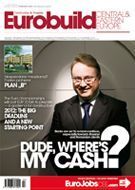The source is drying up. Since the early autumn of 2008, developers and investors have been pushed to the wall, having to contend with much more severe conditions when applying for financing. The few who have managed to secure finance have had to swallow terms that they are not exactly happy with. In 2009, the bankers are hoping for the best. But they are also not afraid to tell it how it is – this year, in fact, might be even more difficult than 2008, especially for players without significant portfolios of completed projects or a long track-record of cooperation with a bank. The banks are also very cautious when it comes to providing financing for projects on over-heated markets, with Romania being the most quoted example, whereas the majority of bankers remain optimistic when it comes to Poland and the Czech Republic. So, when are we going to see an end to all the drama? Mladen Petrov Michał Sternickigeneral manager Poland, Aareal BankThis year is defini




























































